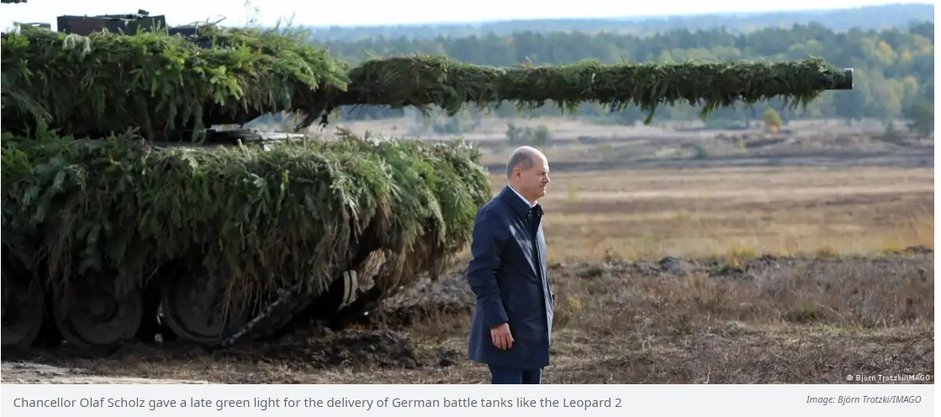22.09.2021
Germany is One of the Biggest Weapon Suppliers to Ukraine: The Good, the Bad and the Ugly
Introduction
The ongoing conflict between Ukraine and Russia, which began in 2014, has resulted in significant human suffering and geopolitical tensions in Eastern Europe. As the conflict persists, Ukraine's government has been increasingly vocal in its calls for military support, particularly from Western nations like Germany. German weapon exports amounted to €4.46 billion in the first half of 2023, a 12% increase compared to the same period in 2022, with Ukraine receiving €4.42 billion in military assistance According to EURACTIV. The detailed listing of all supplied weapons is published on the Central German Government "Bundesregierung" website and can be accessed here. Ukraine's recent request for more weapons from Germany raises important questions about the implications of such support on the conflict's trajectory, regional stability, and international relations. This article explores the implications of Ukraine's efforts to secure additional military aid from Germany, using data points to shed light on the potential consequences.
The Conflict in Eastern Ukraine: A Brief Overview
Before delving into the implications of Ukraine's request for more weapons, it's essential to understand the background of the conflict. In 2014, Russia annexed Crimea, a region previously part of Ukraine. This event marked the beginning of a protracted conflict in Eastern Ukraine, primarily in the Donetsk and Luhansk regions. The conflict has resulted in thousands of deaths, significant displacement, and ongoing hostilities between Ukrainian government forces and pro-Russian separatist groups.
Ukraine's Request for More Weapons from Germany
Ukraine's request for additional military assistance from Germany is not new, but recent developments have brought the issue back into the spotlight. The Ukrainian government has appealed for more weapons, including lethal aid, to bolster its defenses and push back against the separatist forces. Germany, as a key player in European politics and a member of the European Union (EU) and NATO, plays a pivotal role in Ukraine's quest for support.
Implications of Germany's Decision to Provide More Weapons
-
-Escalation of the Conflict: One of the primary concerns surrounding Germany's potential provision of more weapons to Ukraine is the possibility of escalating the conflict. Providing advanced weaponry could embolden Ukrainian forces and lead to intensified fighting, potentially causing more casualties and suffering on both sides.
- Data Point: According to the United Nations, over 13,000 people have been killed and tens of thousands injured in the conflict since 2014.
-
-Deterioration of Relations with Russia: Increased military aid to Ukraine could strain Germany's relations with Russia further. Russia has consistently opposed Western nations providing weapons to Ukraine, viewing it as interference in its sphere of influence.
- Data Point: Western sanctions against Russia, imposed in response to the Crimea annexation and the conflict in Eastern Ukraine, have contributed to economic challenges for both Russia and the EU.
-
-Impact on Regional Stability: The conflict in Eastern Ukraine has had a destabilizing effect on the region. Further military aid to Ukraine could prolong the conflict, making it difficult to achieve a lasting peace settlement.
- Data Point: The Organization for Security and Cooperation in Europe (OSCE) has reported numerous ceasefire violations and incidents of violence in Eastern Ukraine, undermining peace efforts.
-
-Support for Ukraine's Sovereignty: On the positive side, providing additional weapons to Ukraine could be seen as a reaffirmation of Western support for Ukraine's sovereignty and territorial integrity.
- Data Point: The EU and Western nations have consistently condemned Russia's actions in Crimea and Eastern Ukraine, calling for a peaceful resolution and respect for Ukraine's borders.
-
-Impact on European Security: The conflict in Eastern Ukraine has strained European security, leading to concerns about the stability of the wider region. Germany's decision to provide more weapons could have repercussions for European security architecture.
- Data Point: NATO has increased its presence in Eastern Europe to deter further Russian aggression, contributing to tensions between NATO and Russia.
-
-Humanitarian Consequences: Prolonged conflict and increased military aid can exacerbate the humanitarian crisis in Eastern Ukraine. Civilians continue to bear the brunt of the conflict, with widespread displacement and limited access to basic necessities.
- Data Point: The UN estimates that over 2.4 million people have been internally displaced in Ukraine due to the conflict, while many others have sought refuge in neighboring countries.
-
-Complex Diplomatic Dynamics: Germany's decision on military aid to Ukraine must be made within a complex diplomatic context. It involves considerations of EU unity, transatlantic relations, and the broader Russia-Ukraine-West triangle.
- Data Point: Diplomatic efforts, including the Minsk agreements, have sought to negotiate a peaceful resolution to the conflict, but progress has been slow and fraught with challenges.
Conclusion: Navigating a Delicate Balance
Ukraine's request for more weapons from Germany presents a complex and delicate situation for all parties involved. While there are valid concerns about the potential for escalation and strained relations with Russia, there is also a moral imperative to support Ukraine's sovereignty and address the ongoing humanitarian crisis.
Germany's decision on whether to provide more weapons will require careful consideration of these implications, as well as a broader assessment of the conflict's root causes and potential diplomatic pathways to peace. Ultimately, a sustainable resolution to the conflict in Eastern Ukraine must prioritize dialogue, diplomacy, and international cooperation to ensure a lasting and peaceful outcome for the region and its people.



